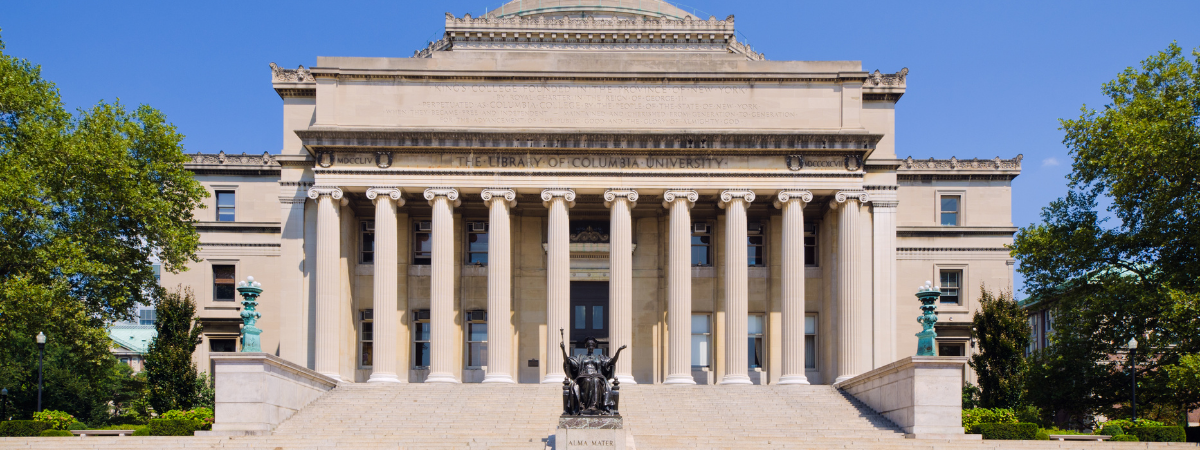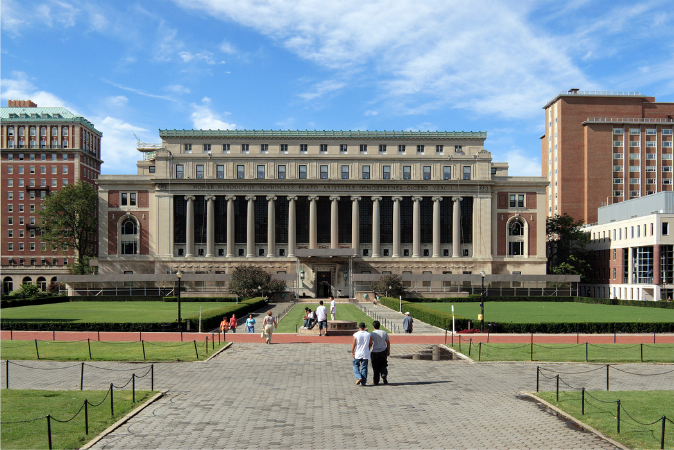
Columbia University
Columbia University in the City of New York is a private Ivy League research institution founded in 1754. Located in Morningside Heights, Manhattan, Columbia is renowned for its rigorous Core Curriculum, deep cultural engagement, and high-impact urban research. The university’s selective admissions reflect a search for curious, creative thinkers poised to thrive in both academic and global communities.
School Profile
Location: New York, New York
Type: Private
Founded: 1754
Address: 116th St & Broadway, New York, NY 10027
Phone: (212) 854-1754
School Website: columbia.edu

What You Need to Know to Apply Columbia
Admissions Stats
Acceptance Rate: 4.0%
Average High School GPA: 4.4
Average SAT Scores: 1520
Average ACT Scores: 34
Application Information
Application Platforms: Common App, Coalition App, or QuestBridge
Test-Optional Policy: Yes
Application Deadlines: Early Decision (11/1); Regular Decision (1/1)
Required Materials: Transcript, 3 Recommendations, School Report
Affordability & Academic Value
Tuition & Fees
Tuition & Fees : $62,570
Room & Board: $16,286
Academics
4-Year Graduation Rate: 88%
Student-Faculty Ratio: 6:1
Columbia Supplemental Essay Prompts
In addition to the Common or Coalition Application personal statement, Columbia University requires applicants to respond to several short supplemental prompts. These essays allow students to highlight their intellectual interests, personal values, and alignment with Columbia’s dynamic academic and cultural environment.
Columbia Supplemental Essay Prompt #1
List the titles of the required readings from academic courses that you enjoyed most during secondary/high school. (75 words or fewer)
Interpretation:
This prompt encourages a glimpse into your academic identity through the lens of classroom reading. Columbia wants to see what has shaped your thinking and interests. Don’t just list prestigious titles—select works that genuinely resonated with you, even if they’re unconventional.
Columbia Supplemental Essay Prompt #2
List the titles of the books, essays, poetry, short stories or plays you read outside of academic courses that you enjoyed most during secondary/high school. (75 words or fewer)
Interpretation:
Here, Columbia is asking about your self-motivated intellectual curiosity. The admissions team wants to know what kinds of ideas, styles, or authors draw you in. Choose works that reveal aspects of your personality or values—curation matters more than quantity.
Columbia Supplemental Essay Prompt #3
We’re interested in what you explore for fun. List the titles of the print, digital, audio or video content (e.g., newspapers, magazines, websites, podcasts, social media, TED Talks, YouTube, movies) you regularly engage with. (75 words or fewer)
Interpretation:
This prompt focuses on how you engage with the world around you. Think of it as a “cultural snapshot”—from thoughtful documentaries to niche blogs or favorite creators. A well-rounded list can highlight both intellectual and personal dimensions of your character.
Columbia Supplemental Essay Prompt #4
List the titles of the academic courses taken most recently (including current courses, if applicable). (75 words or fewer)
Interpretation:
This is a straightforward inventory of your academic preparation. Be accurate, concise, and include any advanced or college-level coursework. Columbia values rigor, and this list helps contextualize your transcript and academic trajectory.
Columbia Supplemental Essay Prompt #5
In Columbia’s unique Core Curriculum, students explore foundational texts across disciplines. Tell us what from your current and past learning experiences might inspire your contributions in the classroom. (200 words or fewer)
Interpretation:
This is Columbia’s Core Curriculum-focused prompt. They’re looking for evidence that you’ll thrive in discussion-based, interdisciplinary learning. Reflect on moments where you made connections across subjects, asked difficult questions, or engaged in thoughtful dialogue. Be specific about what you’d bring to the table.
What Is the Columbia Application Checklist
Columbia University organizes its first-year application process into three primary steps: Submit, Request, and Report. Below is a breakdown of each component to help guide applicants through a complete and competitive submission.
1. Submit
Completed Application: Apply online via the Common Application or Coalition Application. (QuestBridge applicants follow a separate process.)
Columbia-Specific Questions: Respond to Columbia’s supplemental prompts, including list-style and short essays.
Application Fee or Fee Waiver: $85 application fee (fee waiver available based on eligibility).
2. Request
School Report: Must be submitted by your school counselor and include an official transcript and school profile.
Counselor Recommendation: One letter of recommendation from your school counselor.
Two Teacher Recommendations: Letters from two teachers who have taught you in core academic subjects.
3. Report
Midyear Report: Submit once midyear grades are available.
Final Transcript: Required upon graduation.
Standardized Test Scores (Optional): Columbia has adopted a test-optional policy through the 2024–2025 application cycle.
English Proficiency Test: Required for non-native English speakers who attend schools where English is not the language of instruction (TOEFL, IELTS, Duolingo English Test, or Pearson PTE Academic accepted).
Graded Written Paper (Recommended): Columbia recommends submitting a graded analytical or expository writing sample from a humanities or social studies course.
IvyMax Alumni Admitted by Columbia
Academic Profile
High School GPA: 4.5
Standardized Testing: SAT 1540
AP Coursework: 10 AP Courses taken
AP Exam Performance: 8 scores of 5
Future Aspirations
Intends to explore intersections between technology, public policy, and global development. Long-term goals include conducting research that informs ethical innovation and policy frameworks addressing challenges such as data equity, sustainability, and international cooperation. Drawn to Columbia’s global focus and urban setting as a launchpad for advocacy and impactful scholarship.

By submitting this form, you are consenting to receive marketing emails from: IvyMax, 41111 Mission Blvd., Suite 200, Fremont, CA, 94539, https://ivymax.com/. You can revoke your consent to receive emails at any time by using the SafeUnsubscribe® link, found at the bottom of every email. Emails are serviced by Constant Contact
Interested in our program?
Complete the form below and we’ll quickly respond with detailed information, and answers to all your questions!

